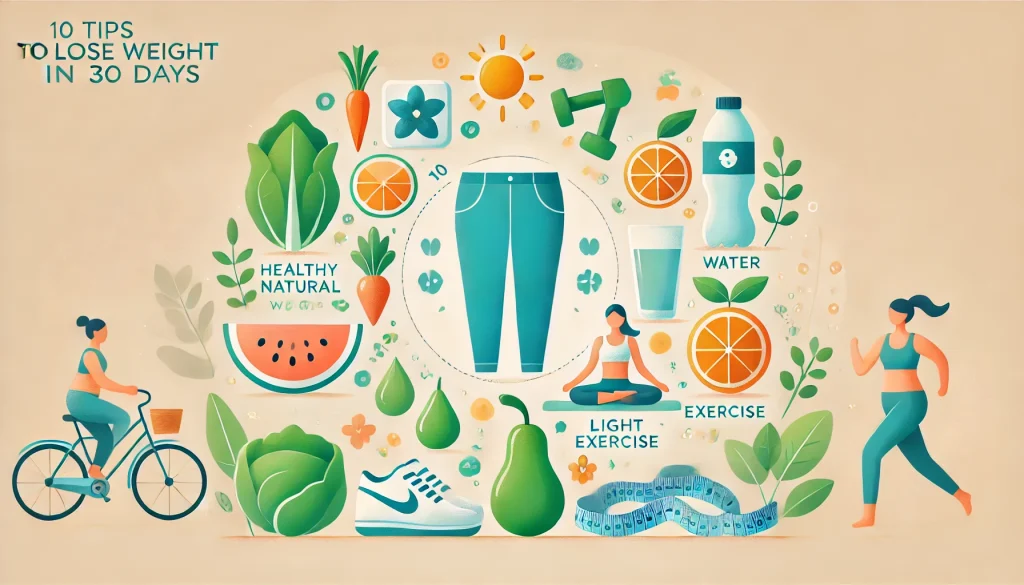10 Natural Ways to Lose Weight in 30 Days

In today’s fast-paced world, many people are seeking quick and sustainable ways to lose weight. While fad diets and extreme measures might offer fast results, they are often not sustainable and can lead to unhealthy side effects. The good news is that you can shed pounds naturally and in a healthy manner. In this article, we’ll explore 10 proven tips to lose weight in just 30 days, all through natural means. These methods are backed by research, ensuring they are safe and effective.
Table of Contents
1. Start Your Day with a High-Protein Breakfast
Research has shown that eating a protein-rich breakfast can help you feel full for longer periods, reducing your overall calorie intake throughout the day. A study published in the American Journal of Clinical Nutrition indicated that participants who consumed a protein-heavy breakfast lost more weight than those who ate carb-heavy or no breakfast at all .
Tip: Include eggs, Greek yogurt, or cottage cheese in your breakfast to boost your protein intake.
2. Stay Hydrated by Drinking Water Before Meals
Drinking water before meals is a simple, natural way to reduce your appetite and calorie intake. Studies suggest that drinking water 30 minutes before eating can significantly reduce hunger and increase feelings of fullness . This leads to consuming fewer calories, aiding in weight loss.
Tip: Drink at least 16 ounces (about two glasses) of water before each meal.
3. Increase Fiber Intake
Eating more fiber is another effective way to lose weight naturally. Soluble fiber absorbs water and forms a gel-like substance in your gut, which slows digestion. This helps you feel full for a longer period, reducing the likelihood of overeating. Research shows that people who consume high-fiber foods like fruits, vegetables, and whole grains tend to weigh less .
Tip: Incorporate fiber-rich foods such as oats, chia seeds, flaxseeds, and legumes into your diet.
4. Incorporate More Movement Into Your Daily Routine
Physical activity doesn’t have to mean long, intense gym sessions. Simply moving more during the day can boost your metabolism and burn more calories. According to a study by the Mayo Clinic, even activities like walking or standing more throughout the day can help burn calories and promote weight loss .
Tip: Aim for at least 10,000 steps a day. Incorporate activities like brisk walking, cycling, or yoga into your daily routine.
5. Eat Whole, Unprocessed Foods
One of the most effective natural ways to lose weight is to focus on whole, nutrient-dense foods. These foods are naturally lower in calories but packed with essential nutrients. Avoid processed foods high in added sugars, unhealthy fats, and artificial ingredients, which contribute to weight gain.
Tip: Fill your plate with vegetables, lean proteins, whole grains, and healthy fats like olive oil and avocado.
6. Get Enough Sleep
Getting adequate sleep is crucial for weight loss. Lack of sleep can disrupt hormones that regulate hunger, leading to increased appetite and cravings for high-calorie foods. According to research from the National Institutes of Health, people who sleep less tend to weigh more .
Tip: Aim for 7-9 hours of sleep each night to help balance your hunger hormones and support your weight loss efforts.
7. Practice Mindful Eating
Mindful eating encourages you to focus on the experience of eating, helping you to enjoy your meals more and recognize when you’re full. This practice can reduce overeating and emotional eating. A study published in Appetite showed that people who practiced mindful eating were more likely to lose weight and maintain it .
Tip: Turn off distractions like TV or smartphones while eating, chew slowly, and listen to your body’s hunger and fullness cues.
8. Use Natural Appetite Suppressants
Certain natural foods and herbs can help suppress your appetite and reduce overeating. For instance, green tea has been shown to increase metabolism and help with fat burning, while apple cider vinegar can enhance feelings of fullness and reduce calorie intake .
Tip: Drink a cup of green tea or add a tablespoon of apple cider vinegar to water before meals to reduce appetite naturally.
9. Manage Stress Levels
Chronic stress can lead to weight gain due to the release of cortisol, a stress hormone that increases appetite and cravings for unhealthy foods. Research shows that stress-relieving activities such as meditation, deep breathing, and yoga can lower cortisol levels and promote weight loss .
Tip: Dedicate at least 10 minutes a day to a stress-reducing activity like meditation, journaling, or yoga.
10. Set Realistic Goals and Track Your Progress
One of the most important aspects of weight loss is setting realistic goals. Unrealistic expectations can lead to disappointment and may cause you to give up. Additionally, tracking your progress can keep you motivated and on track.
Tip: Use a journal or a mobile app to track your meals, exercise, and water intake. Set small, achievable goals, such as losing 1-2 pounds a week.
Conclusion
Losing weight in 30 days is possible with the right combination of natural strategies. By focusing on a balanced diet, regular physical activity, and mindfulness, you can achieve sustainable results. Remember that each body is different, so it’s important to listen to your body’s cues and find what works best for you. Avoid drastic measures and focus on long-term lifestyle changes to maintain your weight loss and improve your overall health.
These 10 tips, backed by research and natural practices, will help you reach your weight loss goals while keeping your body healthy and strong.
References:
- Leidy, H. J., et al. (2009). “The Effects of Consuming Frequent, Higher Protein Meals on Appetite Control and Satiety.” American Journal of Clinical Nutrition.
- Dennis, E. A., et al. (2010). “Water Consumption Increases Weight Loss During a Hypocaloric Diet Intervention in Middle-aged and Older Adults.” Obesity.
- Slavin, J. L. (2005). “Dietary Fiber and Body Weight.” Nutrition.
- Levine, J. A. (2007). “Non-exercise Activity Thermogenesis (NEAT).” Mayo Clinic Proceedings.
- Patel, S. R., et al. (2008). “Sleep Duration and Weight Gain: A Prospective Study.” National Institutes of Health.
- Mason, A. E., et al. (2016). “Effects of a Mindful Eating Intervention on Eating Behaviors, Weight Loss, and Psychosocial Outcomes.” Appetite.
- Westerterp-Plantenga, M. S., et al. (2010). “Green Tea Catechin and Caffeine Synergistically Induce Thermogenesis in Humans.” International Journal of Obesity.
- Kondo, T., et al. (2009). “Vinegar Intake Reduces Body Weight, Body Fat Mass, and Serum Triglyceride Levels in Obese Japanese Subjects.” Bioscience, Biotechnology, and Biochemistry.
- Epel, E. S., et al. (2001). “Stress and Body Shape: Stress-Induced Cortisol Secretion Is Consistently Greater among Women with Central Fat.” Psychosomatic Medicine.
Read More Relate Article:
Exercise Methods for Weight Loss for Obese People


